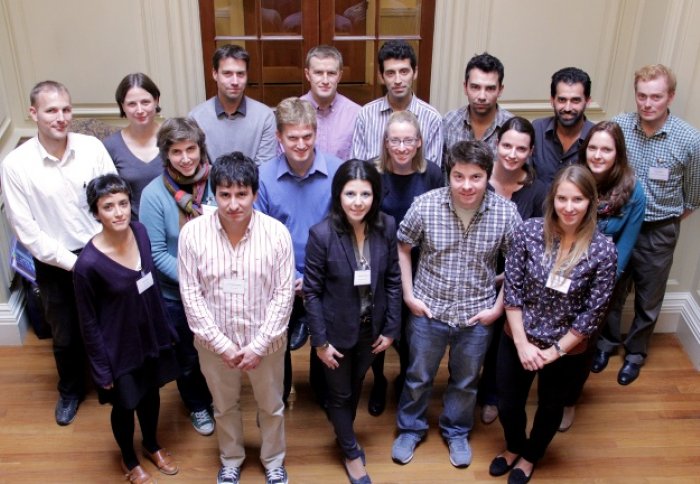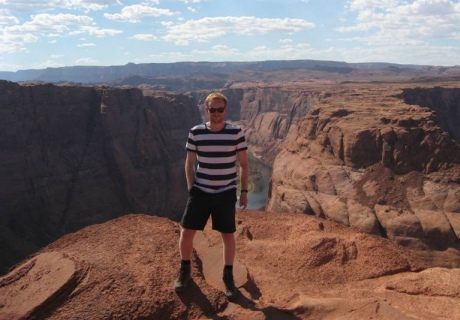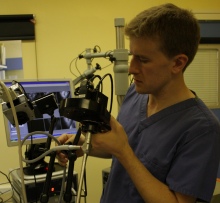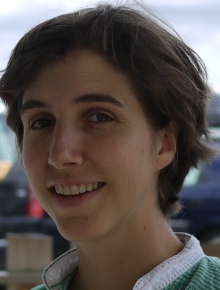Success of Imperial's Junior Research Fellowships continue with new crop of 23

The College's scheme to support outstanding early career researchers celebrates its fifth birthday with the arrival of 23 new Fellows.
The Fellowship scheme was set up in 2009 to help promising researchers make the transition from postdoc to independent investigator by providing them with a competitive salary for three years and by encouraging them to build their research careers without any teaching or administrative obligations.
The new Fellows bring the total number who have benefitted from the scheme to 95.
Among the new intake, researchers will investigate themes as varied as better diagnosis and treatment for cancer, the effects of blast injuries, how the continents have moved over the last 100 million years and the results of EU emissions trading.
Here we meet three of the new crop.
Gareth Roberts
Dr Gareth Roberts will investigate some of the world’s most spectacular landscapes including the Grand Canyon, the Rocky Mountains and Yellowstone National Park in the USA. His research as a JRF will focus on understanding the geological processes deep inside the Earth that cause these regions to be uplifted. He will also analyse some of the geological processes on the surface such as erosion by rivers that help to form these landscapes over time. Understanding the link between processes operating deep inside the Earth and those at its surface helps us to learn more about these landscapes today and what they were like millions of years ago.

Gareth Roberts at the Grand Canyon
Dr Roberts says: “A deeper understanding of the uplift and erosion of the Earth’s surface tells us a lot about processes taking place deep in the Earth. Being a JRF is a stepping stone to a career in academia, providing me with the financial support I need to get on with my research, which I am really looking forward to.”
Professor Philip Allen, Dr Roberts’s JRF sponsor, adds: “This scheme allows us to identify outstanding individuals at a critical stage in their intellectual development and who can benefit from all that the College has to offer. I am really excited to have Gareth join our team. The witch’s cauldron of slow circulation in Earth’s interior is unlikely to reveal its mysteries too easily. So whatever the outcomes of Gareth’s research, I am sure we will have some surprises in store for us.”
Neil Clancy
Dr Neil Clancy’s research aims to develop better ways of diagnosing bowel cancer. Suspected cases of bowel cancer are investigated using colonoscopy, but it’s difficult for doctors to tell from appearance whether growths in the colon called polyps are harmless or if they could turn into cancer.
To make a diagnosis, a sample is removed for testing in the laboratory. This carries a risk of injuring the patient, delays treatment and imposes a substantial burden on the NHS.
 Dr Clancy, already based at Imperial, is a physicist by training. He is working on techniques that could distinguish dangerous from harmless polyps based on visual characteristics. The structure of blood vessels and the colour of the tissue, which relates to how it uses oxygen, are different in growths that have the potential to become cancerous. Technologies that analyse how the polyp absorbs and scatters visible light could provide valuable information to the surgeon.
Dr Clancy, already based at Imperial, is a physicist by training. He is working on techniques that could distinguish dangerous from harmless polyps based on visual characteristics. The structure of blood vessels and the colour of the tissue, which relates to how it uses oxygen, are different in growths that have the potential to become cancerous. Technologies that analyse how the polyp absorbs and scatters visible light could provide valuable information to the surgeon.
“The Holy Grail in endoscopy is to create an optical biopsy,” said Dr Julian Teare, Dr Clancy’s sponsor. “It’s a huge workload to process all these small polyps in the laboratory. If you could use the visual characteristics to accurately predict which ones could become cancerous, it would be safer for the patient and save a lot of money.”
Dr Clancy says the close links here between scientists, engineers and clinicians at Imperial gives his project the best chance of being successful.
“The interactions I have with people from other disciplines on a daily basis are invaluable in my research. I’m not in a bubble developing an instrument that’s just technically interesting, but one that also has the potential for real clinical application.”
Mirabelle Muûls
 Dr Mirabelle Muûls will investigate the impact that climate change policies have had on European companies over the last eight years. For example, Dr Muûls will look at the impact that the European Union Emissions Trading System has had on businesses. She will analyse how their policy has influenced their carbon emission levels, affected their competitiveness and their ability to innovate. An integral part of the policy is that it enables companies to purchase carbon credits from businesses to offset higher emissions levels. She will investigate whether this affects the types of companies they are trading with in order to get an additional emissions allowance.
Dr Mirabelle Muûls will investigate the impact that climate change policies have had on European companies over the last eight years. For example, Dr Muûls will look at the impact that the European Union Emissions Trading System has had on businesses. She will analyse how their policy has influenced their carbon emission levels, affected their competitiveness and their ability to innovate. An integral part of the policy is that it enables companies to purchase carbon credits from businesses to offset higher emissions levels. She will investigate whether this affects the types of companies they are trading with in order to get an additional emissions allowance.
Dr Muûls says: “Climate change is one of the greatest challenges facing our society. Ultimately, I hope that my research can influence future policies aimed at tackling climate change.”
Professor Jonathan Haskel, Dr Muûls sponsor, adds: “It is great to have Mirabelle onboard with us and I look forward to working with her. The JRF scheme is a great opportunity to get as much research done as possible. It is also an opportunity for JRFs to take advantage of their colleagues and glean as much knowledge and information from them as they can.”
Article text (excluding photos or graphics) © Imperial College London.
Photos and graphics subject to third party copyright used with permission or © Imperial College London.
Reporter
Maxine Myers
Communications Division
Kerry Noble
Department of Surgery & Cancer
Colin Smith
Communications and Public Affairs
Sam Wong
School of Professional Development